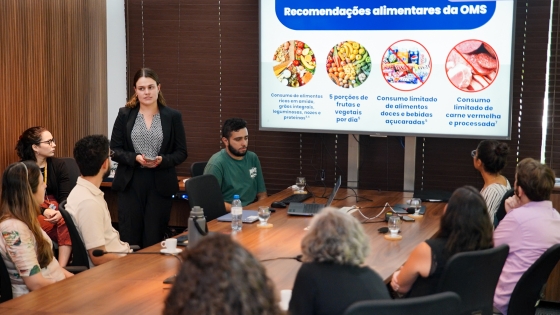MSPH Timeline
-
Academic Program Finder
-
Master's Degrees
- MSPH in Population, Family and Reproductive Health
- Master of Applied Science (MAS) in Patient Safety and Healthcare Quality
- Master of Applied Science (MAS) in Population Health Management
- Master of Applied Science (MAS) in Spatial Analysis for Public Health
- Master of Arts and Master of Science in Public Health (MA/MSPH)
- Master of Arts in Public Health Biology (MAPHB)
- Master of Bioethics (MBE)
- Master of Health Administration (MHA)
- Master of Health Science (MHS) - Department of Biochemistry and Molecular Biology
- Master of Health Science (MHS) - Department of Epidemiology
- Master of Health Science (MHS) - Department of Mental Health
- Master of Health Science (MHS) - Department of Molecular Microbiology and Immunology
- Master of Health Science (MHS) in Health Economics and Outcomes Research
- Master of Health Science (MHS) in Health, Behavior and Society
- Master of Health Science (MHS)
- Master of Health Science - Department of Biostatistics
- Master of Health Science - Department of Population, Family and Reproductive Health
- Master of Health Science in Global Health Economics
- Master of Public Health (MPH)
- Master of Science (ScM) - Department of Biochemistry and Molecular Biology
- Master of Science (ScM) - Department of Biostatistics
- Master of Science (ScM) - Department of Epidemiology
- Master of Science (ScM) - Department of Molecular Microbiology and Immunology
- Master of Science (ScM) in Genetic Counseling
- Master of Science in Public Health (MSPH) in Health Education and Health Communication
- Master of Science in Public Health (MSPH) in Health Policy
-
Master of Science in Public Health - Department of International Health
- Master of Science in Public Health (MSPH) in Global Disease Epidemiology and Control
- Master of Science in Public Health (MSPH) in Health Systems
- Master of Science in Public Health (MSPH) in Human Nutrition
- Master of Science In Public Health (MSPH) In Human Nutrition – Dietitian
- Master of Science in Public Health (MSPH) in Social and Behavioral Interventions
-
Doctoral Degrees
- Doctor of Philosophy (PhD) - Department of Biochemistry and Molecular Biology
- Doctor of Philosophy (PhD) - Department of Biostatistics
- Doctor of Philosophy (PhD) - Department of Epidemiology
- Doctor of Philosophy (PhD) - Department of Mental Health
- Doctor of Philosophy (PhD) - Department of Molecular Microbiology and Immunology
- Doctor of Philosophy (PhD) - Department of Population, Family and Reproductive Health
- Doctor of Philosophy (PhD) in Clinical Investigation
- Doctor of Philosophy (PhD) in Health Policy and Management
- Doctor of Philosophy (PhD) in Social and Behavioral Sciences
- Doctor of Philosophy - Department of International Health
- JHU-Tsinghua Doctor of Public Health
- Doctor of Public Health (DrPH)
- Combined / Dual Degrees
-
Certificate Programs
- Adolescent Health Certificate Program
- Bioethics Certificate Program
- Clinical Trials Certificate Program
- Community- Based Public Health Certificate Program
- Demographic Methods Certificate Program
- Epidemiology for Public Health Professionals Certificate Program
- Evaluation: International Health Programs Certificate Program
- Frequently Asked Questions for Certificate Programs
- Gender and Health Certificate Program
- Gerontology Certificate Program
- Global Digital Health Certificate Program
- Global Health Certificate Program
- Global Health Practice Certificate Program
- Health Communication Certificate Program
- Health Disparities and Health Inequality Certificate Program
- Health Education Certificate Program
- Health Finance and Management Certificate Program
- Healthcare Epidemiology and Infection Prevention and Control Certificate Program
- Humanitarian Health Certificate Program
- Implementation Science and Research Practice Certificate Program
- Injury and Violence Prevention Certificate Program
- Leadership for Public Health and Healthcare Certificate Program
- Lesbian, Gay, Bisexual, Transgender, and Queer (LGBTQ) Public Health Certificate Program
- Maternal and Child Health Certificate Program
- Mental Health Policy, Economics and Services Certificate Program
- Non-Degree Students General Admissions Info
- Pharmacoepidemiology and Drug Safety Certificate Program
- Population Health Management Certificate Program
- Population and Health Certificate Program
- Public Health Advocacy Certificate Program
- Public Health Economics Certificate Program
- Public Health Informatics Certificate Program
- Public Health Training Certificate for American Indian Health Professionals
- Public Health, Human Rights, and the Law Certificate Program
- Public Mental Health Research Certificate Program
- Quality, Patient Safety and Outcomes Research Certificate Program
- Requirements for Successful Completion of a Certificate Program
- Rigor, Reproducibility, and Responsibility in Scientific Practice Certificate Program
- Risk Sciences and Public Policy Certificate Program
- Social Epidemiology Certificate Program
- Spatial Analysis for Public Health Certificate Program
- Training Certificate in Public Health
- Tropical Medicine Certificate Program
- Tuition for Certificate Programs
- Vaccine Science and Policy Certificate Program
- Online Programs
- Accelerated Learning Institutes
- Postdoctoral Programs
- Residency Programs
- Graduate Training Programs in Clinical Investigation
- For Working Professionals
-
Training Grants
-
Mixed Methods Research Training Program for the Health Sciences
- About the Program
- Announcements
- Application Process
- Contact Us
-
Current Scholars
-
2015 Scholars
- Jennifer I Manuel, PhD, MSW
- Joke Bradt, PhD
- Josiemer Mattei, PhD, MPH
- Justin Sanders, MD, MSc
- Linda Charmaran, PhD
- Nao Hagiwara, PhD
- Nynikka R. A. Palmer, DrPH, MPH
- Olayinka O. Shiyanbola, BPharm, PhD
- Sarah Ronis, MD, MPH
- Susan D. Brown, PhD
- Tara Lagu, MD, MPH
- Theresa Hoft, PhD
- Wynne E. Norton, PhD
- Yvonne Mensa-Wilmot, PhD, MPH
-
2016 Scholars
- A. Susana Ramírez, PhD, MPH
- Animesh Sabnis, MD, MSHS
- Autumn Kieber-Emmons, MD, MPH
- Benjamin Han, MD, MPH
- Brooke A. Levandowski, PhD, MPA
- Camille R. Quinn, PhD, AM, LCSW
- Justine Wu, MD, MPH
- Kelly Aschbrenner, PhD
- Kim N. Danforth, ScD, MPH
- Loreto Leiva, PhD
- Marie Brault, PhD
- Mary E. Cooley, PhD, RN, FAAN
- Meganne K. Masko, PhD, MT-BC/L
- PhuongThao D. Le, PhD, MPH
- Rebecca Lobb, ScD, MPH
-
2017 Scholars
- Allegra R. Gordon, ScD MPH
- Anita Misra-Hebert, MD MPH FACP
- Arden M. Morris, MD, MPH
- Caroline Silva, PhD
- Danielle Davidov, PhD
- Hans Oh, PhD
- J. Nicholas Dionne-Odom, PhD RN ACHPN
- Jacqueline Mogle, PhD
- Jammie Hopkins, DrPH, MS
- Joe Glass, PhD MSW
- Karen Whiteman, PhD MSW
- Katie Schultz, PhD MSW
- Rose Molina, MD
- Uriyoán Colón-Ramos, ScD MPA
-
2018 Scholars
- Andrew Riley, PhD
- Byron J. Powell, PhD, LCSW
- Carrie Nieman MD, MPH
- Charles R. Rogers, PhD, MPH, MS, CHES®
- Emily E. Haroz, PhD
- Jennifer Tsui, Ph.D., M.P.H.
- Jessica Magidson, PhD
- Katherine Sanchez, PhD, LCSW
- Kelly Doran, MD, MHS
- Kiara Alvarez, PhD
- LaPrincess C. Brewer, MD, MPH
- Melissa Radey, PhD, MA, MSSW
- Sophia L. Johnson, PharmD, MPH, PhD
- Supriya Gupta Mohile, MD, MS
- Virginia McKay, PhD
-
2019 Scholars
- Andrew Cohen, MD, PhD
- Angela Chen, PhD, PMHNP-BC, RN
- Christopher Salas-Wright, PhD, MSW
- Eliza Park MD, MS
- Jaime M. Hughes, PhD, MPH, MSW
- Johanne Eliacin, PhD, HSPP
- Lingrui Liu ScD MS
- Meaghan Kennedy, MD
- Nicole Stadnick, PhD, MPH
- Paula Aristizabal, MD
- Radhika Sundararajan, MD
- Sara Mamo, AuD, PhD
- Tullika Garg, MD MPH FACS
-
2020 Scholars
- Allison Magnuson, DO
- Ariel Williamson PhD, DBSM
- Benita Bamgbade, PharmD, PhD
- Christopher Woodrell MD
- Hung-Jui (Ray) Tan, MD, MSHPM
- Jasmine Abrams, PhD
- Jose Alejandro Rauh-Hain, MD
- Karen Flórez, DrPH, MPH
- Lavanya Vasudevan, PhD, MPH, CPH
- Maria Garcia, MD, MPH
- Robert Brady, PhD
- Saria Hassan, MD
- Scherezade Mama, DrPH
- Yuan Lu, ScD
- 2021 Scholars
-
2015 Scholars
- Resources
- Sign Up for Our Email List
-
Mixed Methods Research Training Program for the Health Sciences
-
Master's Degrees
- Course Directory
- Academic Calendar
- Hybrid Campus
- Convocation
- Lecture Series
Students complete the PFRH MSPH degree in two years. The first year involves intensive coursework. In the summer and fall of the second year, students complete a field placement. During the final two terms of the program, students write and present a culminating master’s essay and take additional courses. Though not required, many students plan their elective coursework to earn certificates offered by PFRH and other Departments in the School. Full PFRH MSPH program requirements are outlined in the JHU Academic Catalogue.
Year 1: Terms 1-4: Intensive coursework
In addition to taking biostatistics, epidemiology, ethics, and other courses to meet Council on Education in Public Health (CEPH) requirements, PFRH MSPH students complete coursework to meet five program competencies. For competencies where there are multiple options, students’ course selections may be guided by area of interest:
🔵 Child and Adolescent Health
🟢 Maternal, Fetal and Perinatal Health
🟣 Population and Health
🟡 Women’s, Sexual and Reproductive Health
1. Apply a life course framework to understand population health problems, including a multiple determinants framework for the health of populations across the life course
380.604 Life Course Perspectives on Health 🔵🟢🟣🟡
2. Identify and assess the causes and consequences of population change using demographic methods
Choose 1 course
380.600 Principals of Population Change 🔵🟢🟣🟡
380.603 Demographic Methods for Public Health 🔵🟢🟣🟡
3. Assess the principal health concerns for populations, the associated population-based risk factors, and the relative impact of each risk factor
Choose 1 course
380.664 Reproductive and Perinatal Epidemiology 🟢🟡
380.666 Women’s Health 🟡
380.616 Child Health Epidemiology 🔵
380.623 Adolescent Health and Development 🔵
380.747 International Adolescent Health 🔵
380.750 Migration and Health: Concepts, Rates and Relationships 🟣
4. Evaluate strategies to promote population health, including health services and systems delivery strategies used to address health concerns in populations
Choose 1 course
380.665 Family Planning Policies and Programs 🔵🟣🟡
380.661 Clinical Aspects of Maternal and Newborn Health 🔵🟢
221.627 Issues in the Reduction of Maternal and Neonatal Mortality in Low Income Countries 🟢🟣
380.667 Women’s Health Policy 🟡
380.768 Selected Topics in Women’s Health and Women’s Health Policy 🟡
380.760 Clinical Aspects of Reproductive Health 🟡
5. Apply frameworks (beyond life course) for improving the health of populations
Choose 1 course
380.655 Social and Economic Aspects of Human Fertility 🟢🟣🟡
380.744 Nutrition and Growth in Maternal and Child Health 🔵🟢
380.725 The Social Context of Adolescent Health and Development 🔵
380.642 Child Health and Development 🔵
380.668 International Perspectives on Women, Gender and Health 🟡
Year 2: Terms 1-2 (Fall): Field Placement
Learn more about field placement opportunities and read first-hand accounts from PFRH students about their experiences in local and global organizations.

MSPH student Elena Kern during her 2023 field placement in Quito, Ecuador

MSPH student Shae Nicolaisen presents to city leadership during her 2024 field placement in Fortaleza, Ceará, Brazil
Year 2: Terms 3-4 (Spring):
Master’s Essay and remaining coursework
Watch additional recordings of PFRH master’s essay presentations
Learn more about additional courses offered and recommended by PFRH
